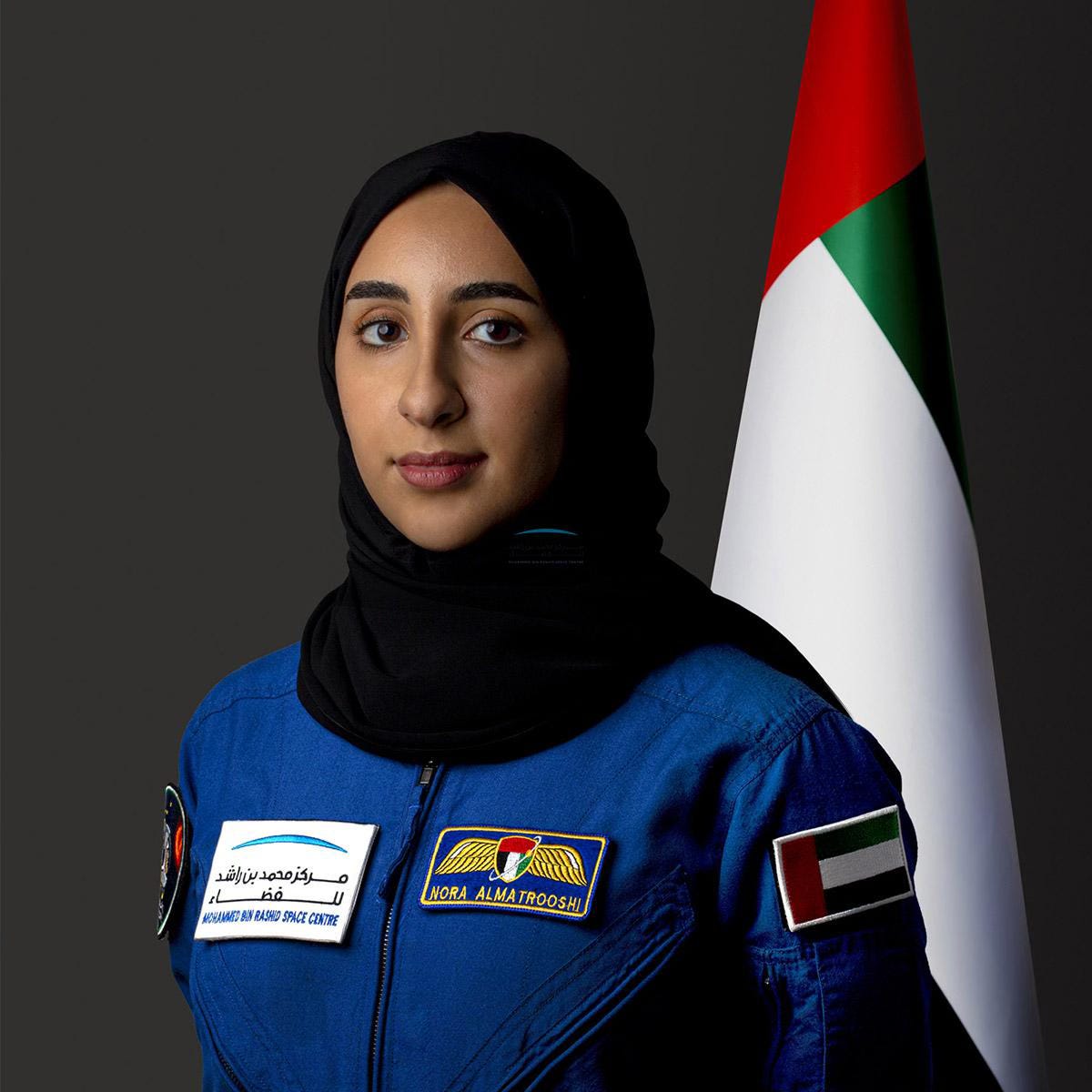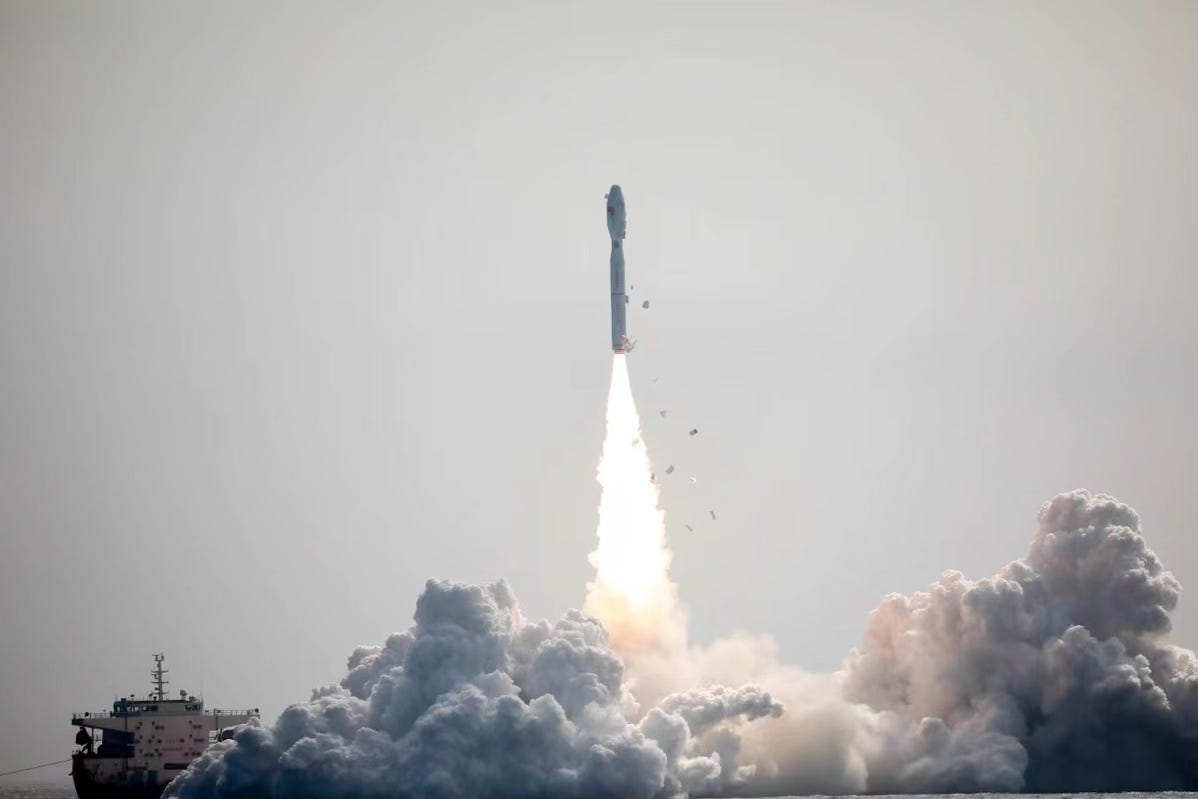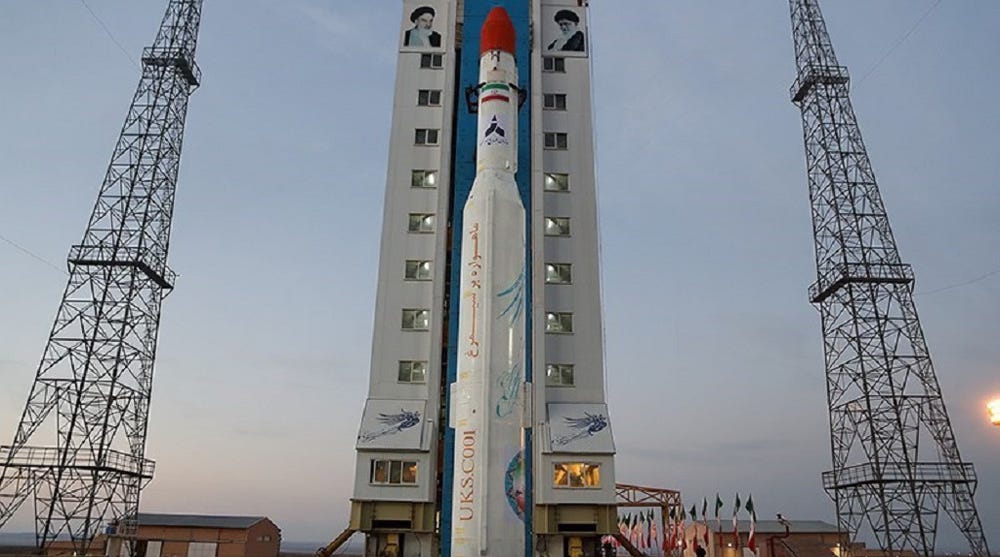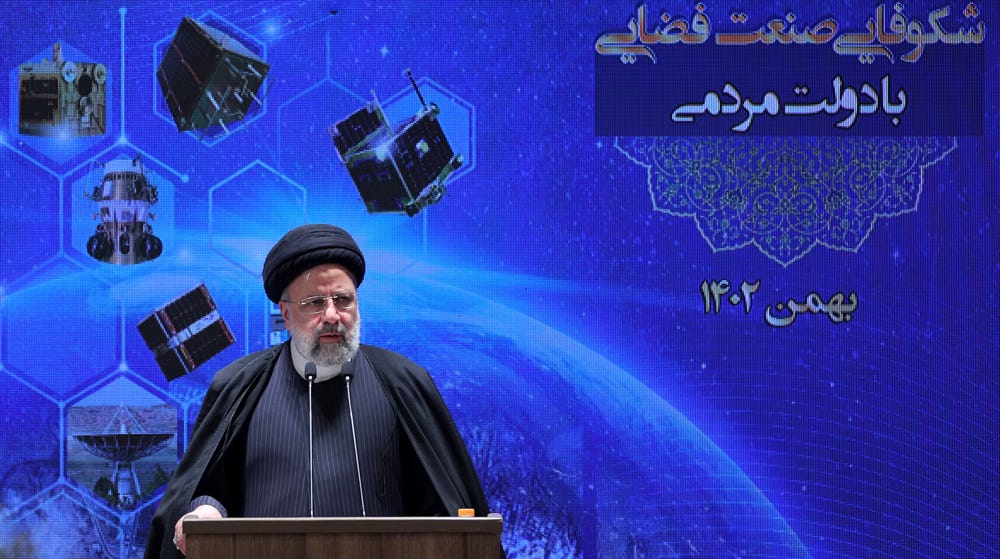Middle East Space Roundup: 29 January to 4 February 2024
A summary of all the space news in the Greater Middle East over the past week, brought to you by AzurX

The following are the major space developments in the Greater Middle East region tracked by Middle East Space Monitor over the past week:
Iran Space Developments
Iran Aims to Develop Satellite Launch Vehicles Capable of Lofting 15-Ton Payloads to Orbit
Iran's defence ministry has revealed its long-term plans to develop satellite launch vehicles (SLVs) with the capability to carry payloads weighing up to 15 tons into orbit. This announcement follows Iran's recent successful launch of three domestically-developed satellites using the Simorgh SLV. The spokesperson for the ministry's space division emphasised that Iran's space activities are driven by scientific and technological goals and will continue independently. The roadmap includes the Sarir SLV, designed to place payloads weighing 1.5 tons into low-Earth orbit or geostationary orbit up to 36,000 kilometers above the Earth's surface. Additionally, the future includes the Soroush family of SLVs, which will be capable of launching payloads ranging from 6 to 15 tons into space. Despite facing sanctions from Western countries, Iran has made significant advancements in its civilian space programme, ranking among the top 10 countries with satellite development and launch capabilities.
Recently Launched Iranian Satellites Pave Way for National Space-Based IoT Constellation
Iran is actively advancing its capabilities in the Internet of Things (IoT) and satellite technology through projects like the Qassem Soleimani System. The recent successful launch of the Hatef and Keyhan satellites on a Simorgh satellite launch vehicle underscores Iran's commitment to IoT development. These satellites serve as testbeds for IoT and narrowband communication technologies, essential for their further enhancement. The Mahda satellite plays a crucial role in testing communications technology with a focus on assessing component lifespan exposed to space radiation. Iranian space authorities emphasise the importance of flawless satellite operations in orbit and the need to identify and rectify design flaws and technical issues to prolong their lifespan. Keyhan and Hatef satellites, specialising in navigation assistance and IoT technologies, are instrumental in advancing Iran's space capabilities. The country's progress in satellite technology, including the development of launchers like Qaem-100, showcases its commitment to space research and innovation.
Iranian Official Sets Out Iran’s Future Space Plans and Dismisses Western Concerns
Iran's Ministry of Defence's Aerospace Division spokesperson, Ahmad Hosseini-Muness, highlighted the self-reliant and technologically significant progress achieved by Iran in the aerospace industry during a recent press conference. He emphasised the role of the aerospace sector in the country's industrial landscape and future technological advancements, cautioning against neglecting current opportunities. Hosseini-Muness clarified that Iran's space programme is driven by purely scientific and technological objectives, dismissing concerns about Western reactions to satellite launches. He stressed the priority of leveraging internal capabilities while remaining open to cooperation with other countries, citing successful collaborations like the launch of the Omar Khayyam Earth observation satellite with Russia. Iran's future plans include advanced versions of the Simorgh satellite launch vehicle (SLV, cryogenic engine production with universities, and upcoming SLV projects like Sarir and Soroush, indicating a continued commitment to space exploration and cooperation with international partners.
Iran Celebrates National Space Technology Day
On 3 February 2024, Iran celebrated National Space Technology Day, commemorating its achievements in space exploration despite facing unilateral sanctions. The day marks the successful launch of Iran's first satellite, Omid (Hope), in 2009, which placed the nation among the nine countries capable of indigenous satellite launches. Since then, Iran has been steadfast in developing its space industry and achieving self-reliance in the field. A recent milestone was the successful launch of three homegrown satellites, taking steps toward geosynchronous orbit access. Iran's commitment to space technology is underlined by its intent to launch ten more satellites and develop a state-of-the-art 1.5-ton space capsule. This progress aligns with Iran's broader goal of enhancing its economic strength through advancements in space sciences and industries, with a focus on commercialisation and self-reliance. The country's aspiration to achieve human spaceflight capacity underscores its determination to expand its space capabilities and technological prowess.
Iran Ready to Collaborate on SATCOM, AI, Quantum Technologies Within Shanghai Cooperation Organisation
Iran is expressing its readiness to collaborate with the Shanghai Cooperation Organisation (SCO) on digital infrastructure development, including cross-border optical fiber networks, data centers, and satellite communications. Iran's strategic location along the Digital Silk Road positions it to facilitate the expansion of digital infrastructure, including 5G technology and satellite networks. At the SCO's Digital Forum, Iran's ICT Minister Issa Zarepour emphasised the importance of cooperation in building a safer and more prosperous cyberspace. He highlighted the rapid advancement of emerging technologies like artificial intelligence (AI) and quantum computing, stressing the need to bridge the digital divide. Zarepour called for a multipolar cyberspace that counters monopolies held by major tech companies and encouraged countries to unite to play a key role in shaping the future of the digital world through collaboration on digital platforms, common data centers, and AI solutions for sustainable development. He also addressed the challenge of extraterritorial influence by the private sector and the importance of upholding national sovereignty in cyberspace governance.
Iran’s President Touts Country as a Top Ten Global Space Power
Iran's President Ebrahim Raisi, speaking at the National Space Technology Day ceremony in Tehran, highlighted Iran's significant achievements in the space industry, asserting that Iran ranks among the top 10 countries leading in this field. Raisi emphasised that space presence not only brings power but also hope and wealth to Iran. He noted that despite efforts by adversaries to impose sanctions and isolate Iran, the country's 11 successful space launches have not only defied sanctions but also thwarted the isolation plan. Raisi emphasised the importance of space presence for Iran, urging the continued development of the country's space infrastructure and an increase in the number of precise launches. Under his administration, Iran completed the design and construction of three satellites, with six more ready for launch, and plans to reach a total of 12 by the end of the year.
Saudi Arabia Space Developments
Saudi Arabia’s Cabinet Approves Establishment of Supreme Space Council
Saudi Arabia’s cabinet, chaired by King Salman, approved the regulation of the Supreme Space Council, underscoring the strategic importance of the space sector as a driver of innovation and a trillion-dollar global economy. The council, led by Crown Prince Mohammed Bin Salman, aims to position Saudi Arabia as a key player in the space industry. The Cabinet also discussed international relations, emphasising the need for international efforts to secure a ceasefire in Gaza, protect Palestinian rights, and hold Israeli forces accountable for violating international law. Additionally, the Cabinet focused on developing vital sectors aligned with Vision 2030 goals, including biotechnology, housing, and real estate. It approved various agreements and memoranda of understanding to advance cooperation in areas such as oil, sports, environment, and economic planning, highlighting Saudi Arabia's commitment to global engagement and economic development.
Saudi Arabia in Advanced Talks with China on Space Cooperation and Satellite Technology Transfer
Saudi Arabia is actively engaged in negotiations with Chinese space contractors, aiming to establish a comprehensive agreement covering technology transfer, collaborative satellite module production, and technical training, according to Tactical Report. Negotiations were temporarily paused in 2023 due to concerns about potential U.S. sanctions targeting individuals and entities involved in the deal. However, talks resumed later in the year, resulting in frameworks including Memoranda of Understanding for technical exchange and training programmes, agreements on satellite launch centre construction, and a license agreement for advanced communication software. Negotiators are still working on technology transfer for advanced satellite module components, with the delay attributed to concerns about technology leakage. The U.S. has expressed dissatisfaction over Saudi dealings with entities from China, including threats that could disrupt imports of vital components for existing satellite command centres in Saudi Arabia. This development aligns with Saudi Vision 2030, aiming to diversify technology suppliers and expand collaborations in the space industry with China.
Other News
Controversy Continues to Stalk Türkiye’s First Astronaut Mission After Critical Erdogan Video Resurfaces
Criticisms of the recent launch of Türkiye's first astronaut, Alper Gezeravci, into space continue to spark controversy over the cost of the mission. Critics have raised concerns about Türkiye paying tens of millions of dollars to the Texas startup Axiom Space for Gezeravci's participation in the commercial space journey. The controversy deepened when footage from 2021 resurfaced, showing Turkish President Recep Tayyip Erdogan criticizing spending "hundreds of millions of dollars for a few minutes of touristic space travel" while people on Earth face food insecurity. Despite this, Erdogan praised the mission, which is part of Türkiye's National Space Programme, emphasising its potential contributions to various scientific fields. Gezeravci and the crew will conduct numerous experiments in microgravity during their two-week stay in space. Some critics view the mission as a political move in anticipation of Türkiye's upcoming local elections, while others question the allocation of resources in the face of pressing domestic issues.
Azerbaijan’s Azercosmos Provides Radio Frequency Management Training to Bahrain
Azercosmos, the Space Agency of Azerbaijan, has introduced a 10-day training and consultancy programme on radio frequency management to the Telecommunications Regulatory Authority of Bahrain. The programme, conducted in Manama, covered various aspects of radio frequency management, including satellite and ground station registration, interference resolution between satellite networks, and legal considerations. After the programme, participants received certificates. This initiative reflects Azercosmos' commitment to sharing its expertise in the field of space technology and radio frequency management with international partners, contributing to the development of the telecommunications and space sectors in Bahrain, and fostering collaboration in the global space community.
Second Cohort of UAE Astronauts, Including UAE’s First Female Astronaut, Set to Graduate
The United Arab Emirates (UAE) is on the brink of another significant milestone in its space exploration journey, as its first female astronaut, Nora Al Matrooshi, along with her colleague Mohammed Al Mulla and 11 American astronaut candidates, prepares to graduate from NASA's rigorous training programme in March 2023. The completion of this training will render them eligible for various space missions, including potential trips to the International Space Station (ISS) and participation in future U.S.-led missions, such as those planned under NASA's Artemis programme, which aims to return humans to the Moon and eventually travel to Mars. This achievement follows the successful training of the UAE's first two astronauts, Sultan Al Neyadi and Hazza Al Mansouri, who completed the NASA programme in 2022. The UAE's investment in astronaut training and space exploration aligns with its ambitious space goals, including participation in missions to the Lunar Gateway, further solidifying the country's presence in the global space community. The specific Emirati astronaut to embark on a Gateway mission has yet to be determined, with preparations continuing as the UAE expands its capabilities in space science and technology.
Azerbaijan’s Azercosmos Reports 2023 Revenue Decline Compared to 2022
In 2023, Azerbaijan's Azercosmos reported total revenues of $19.8 million from its satellite and telecommunication services, marking a decrease of $6.8 million (25.56%) compared to the previous year's figures. The month of December 2023 contributed $1.8 million to this revenue, highlighting the agency's ongoing service exports to 45 countries. Notable clients included the United Kingdom ($5.8 million), Luxembourg ($4.1 million), the UAE ($1.6 million), Germany ($1 million), and Nigeria ($724,900). While these figures indicate a decrease from the previous year's earnings of $26.6 million, they reflect the agency's ongoing engagement in the global satellite and telecommunication services market, albeit with some fluctuations in revenue.
Israeli Space Forum to Boost Israel’s Space Sector and Exports
The Israeli Space Forum, scheduled for launch on 2 April 2024, aims to foster growth in Israel's emerging space sector by connecting various stakeholders, including companies, entrepreneurs, start-ups, investors, academics, and government bodies. In collaboration with organisations such as the Israel Innovation Authority, the Israel Export Institute, and Israel Aerospace Industries (IAI), the forum seeks to facilitate entrepreneurial activities and provide opportunities for Israeli firms to enter the expanding global space market. Israel Space Agency Director-General Uri Oron views the space industry as a catalyst for economic and social development in Israel. With the current space industry valued at over $1.64 billion annually, it is predicted to grow significantly in the coming decades, potentially reaching over $26.26 billion by 2035. The forum aligns with the country's ambitions to tap into the economic benefits of its space sector and promote Israeli technologies on the global stage.
UAE’s EduTech4Space Signs MoU with Space Zone India for Launching Cubesats on Hybrid Rocket
In a significant development for the aerospace industry, Space Zone India, known for launching India's first hybrid rocket, and UAE-based aerospace company EduTech4Space, have entered into a transformative Memorandum of Understanding. This agreement aims to shape the future of space exploration through international collaboration. The signing ceremony was attended by Padmasree Dr. Mylswamy Annadurai and other notable figures. Space Zone India, led by CEO Dr. Anand Megalingam, and EduTech4Space, under the leadership of Sree Sudha, are committed to pushing the boundaries of aerospace technology and education. The MoU goes beyond traditional collaboration, with Space Zone India scheduled to launch its hybrid rocket in 2026 and provide launch facilities for EduTech4Space's cube satellites, a significant step in commercialising hybrid rocket technology. This partnership holds the promise of pioneering new frontiers in aerospace, supported by visionary leadership and an illustrious assembly of experts.
Israel’s Gilat Awarded Military Satellite Communications Networking Contract
Israel’s Gilat Satellite Networks Ltd., a prominent player in satellite networking technology, has secured a multimillion-dollar contract for a defence satellite connectivity project. The project involves enhancing satellite communication capabilities for a leading governmental defence organisation using Gilat's SkyEdge IV platform and Taurus-M modems. SkyEdge IV is a next-generation multi-service platform designed to work seamlessly with multi-orbit satellite constellations (GEO, MEO, and LEO) and supports cloud infrastructure. It also offers an Elastix-Access Scheme for scalable satellite connectivity. The Taurus-M modem, designed for military and government applications, is ruggedised, easy to deploy, and complies with MIL-STD-810 standards. This project underscores Gilat's commitment to addressing the defence sector's demands for high-performance, reliable, and secure satellite communication solutions, positioning it as a key growth engine in the company's portfolio.
Algeria, Egypt, Morocco, Sudan, and Other Africa Group Countries Make Recommendations at COPUOS
The Africa Group, comprising delegates from Algeria, Egypt, Kenya, Morocco, Nigeria, Rwanda, South Africa, and Sudan, has put forth significant recommendations during the 2024 Committee on the Peaceful Uses of Outer Space – Scientific and Technical Subcommittee meeting. These suggestions aim to enhance international space collaborations and deepen Africa's involvement in global space affairs. The group advocates for increased cooperation between the United Nations Office for Outer Space Affairs (UNOOSA) and the African Union Commission (AUC) while emphasising the importance of a stronger legal framework for international cooperation. They call for outreach programs to expand African participation in the United Nations Committee on the Peaceful Uses of Outer Space (UNCOPUOS). Furthermore, the group underscores the importance of inclusivity, recommending the recruitment and engagement of more Africans at the UNOOSA secretariat. Additionally, African governments are encouraged to integrate space activities into their national development agendas, collaborate with the African Union, and promote space technology coordination on the continent. The Africa Group also highlights concerns about space debris and calls for responsible mitigation and removal efforts while emphasizing the peaceful use of outer space principles for all UNOOSA member states.
President of Italian Space Agency Lauds Israel-Italy Space Cooperation
Professor Teodoro Valente, President of the Italian Space Agency, underscores the importance of collaboration in space exploration as a means of fostering diplomacy and building bridges on Earth. He highlights the International Space Station as an environment where boundaries cease to exist, promoting cooperation among astronauts from various countries regardless of technological disparities or geopolitical situations. Valente emphasises the significance of space exploration in stimulating imagination and understanding the universe's origins, Moon and Mars exploration, and its impact on people's aspirations. He discusses potential collaboration between Italy and Israel on the Beresheet-2 lunar mission, reflecting their rich history of cooperation in space activities dating back to 2005. This collaboration includes projects like CubeSat, aimed at conducting experiments in weightlessness to develop pharmaceuticals, and the Juice Mission, which explores Jupiter's icy moons with contributions from multiple countries. Valente stresses that cooperation in space exploration advances knowledge, creates shared goals, and generates employment opportunities, acknowledging that space exploration is too costly for any single country to pursue alone, highlighting the significance of international partnerships in the space industry.
Israeli Scientists Propose Space-Based Sunshade to Reduce Global Warming
Amid escalating concerns over climate change and global warming, a growing number of astronomers and physicists are exploring a novel solution: deploying a massive sunshade in outer space to mitigate rising temperatures on Earth. The concept involves placing a giant sunshade between Earth and the sun, blocking approximately 2 percent of solar radiation, which could reduce global temperatures by 1.5 degrees Celsius (2.7 Fahrenheit). While the idea has been on the fringes of climate solutions for years, recent interest has sparked various proposals, including scattering dust into space or using "space bubbles" as shields. Yoram Rozen, a physics professor at Technion-Israel Institute of Technology, is leading a team ready to build a prototype sunshade, seeking $10-20 million in funding. Proponents argue that while a sunshade would not replace the need to reduce greenhouse gas emissions, it could help stabilise the climate as other mitigation strategies are pursued. Critics, however, argue that the project's cost and potential risks make it an impractical solution compared to reducing emissions and other geoengineering ideas.

China Successfully Launches Egypt’s NexSat-1 Experimental Earth Observation Satellite
The Egyptian Space Agency (EgSA) achieved a significant milestone with the successful launch of its experimental satellite, NexSat-1, using China's Jielong-3 (Smart Dragon-3) launch vehicle. The satellite, developed in collaboration with Germany's Berlin Space Technologies, represents a crucial step forward for Egypt's national space program. EgSA played a ceentral role in the satellite's development, including creating essential operating software, conducting tests, integration, assembly, and testing procedures. Dr. Sherif Sedky, CEO of EgSA, highlighted the importance of NexSat-1 in advancing micro-satellite technology localisation in Egypt. The satellite features electro-optical imaging capabilities with a multispectral resolution of 5.7 meters, making it capable of capturing high-detail imagery. This achievement not only localises design technology but also sets the stage for future satellite manufacturing and economic growth, aligning with sustainable development goals.
Türkiye and Kazakhstan Discuss Space Cooperation
Kazakhstan's Ambassador to Türkiye, Yerkebulan Sapiyev, and Türkiye's Minister of Industry and Technology, Mehmet Fatih Kacır, recently held discussions on various significant issues and plans for the year ahead, focusing on industry, space, and information technology. The Turkish Minister highlighted the spaceflight of the first Turkish astronaut and stressed the importance of developing relations in the field of space programmes, both bilaterally and within the Organisation of Turkic States. Kazakhstan's ambassador, on the other hand, emphasised Kazakhstan's experience in space exploration and its investment attractiveness, while also extending an invitation to Turkish production enterprises to consider relocating to Kazakhstan. The discussions resulted in an agreement to strengthen partnership and cooperation in these areas.
Other News in Brief
Among the other regional space and satellite developments over the past week are:
Azerbaijan and the Islamic World Educational, Scientific, and Cultural Organization (ICESCO) discuss space science cooperation;
The United States is sponsoring a group of about 20 teenagers from Libya to attend Space Camp in Alabama in August 2024;
The volume of trade between Oman and China has reached $40.45 billion, with Chinese satellite company Star.Vision’s Omani activities contributing to this volume;
Recommended Reading
UAE’s First Female Astronaut Nora Al Matrooshi Set to Make History
Maggie Kinsella writes in the Khalifa University Science and Tech Review that the UAE will be celebrating International Women's Day with the news of its first female Emirati astronaut, Nora Al Matrooshi, graduating from NASA's 2023 training programme in March 2024. Selected from over 4,000 applicants, Al Matrooshi was inspired by her teacher's imaginative classroom activities, fueling her ambition to reach the stars. Her graduation highlights the UAE's commitment to space exploration and gender diversity. While Valentina Tereshkova was the first woman in space in 1963, women's representation in space remained limited until recent years. Al Matrooshi hopes to inspire young women to pursue careers in space and break barriers. With her graduation, the UAE's astronaut count reaches four, reflecting the country's growing space programme. The UAE's collaboration with NASA, including providing an airlock for the Gateway lunar station, signifies the country's commitment to lunar exploration, with plans for its lunar mission in the future, coinciding with the Lunar Gateway's first mission in 2028, as per NASA's timeline.
The Coming Boom in the Middle East’s Space Sector
In Fast Company Middle East, Karrishma Modhy writes that the Middle East is transforming its relationship with space technology and exploration, with seven countries in the region introducing national space policies or strategies since 2015. This shift has coincided with significant growth in the Middle East's space industry, which has expanded threefold over the past decade, reaching $25 billion in revenues and possibly surging to $75 billion by 2032. Key areas of development include satellite manufacturing, component manufacturing, space tourism, as well as investments in research and development, innovation, and technology. Partnerships with international aerospace companies, educational programmes, and knowledge transfer have also played a crucial role in this evolution. The Middle East's space market is expected to grow exponentially, reaching $57 billion by 2030, driven by initiatives like space tourism and advancements in aerospace technology, including electric propulsion systems and AI integration.
Be sure to catch up with space activities in the region in the next edition of Middle East Space Monitor’s space roundup!






